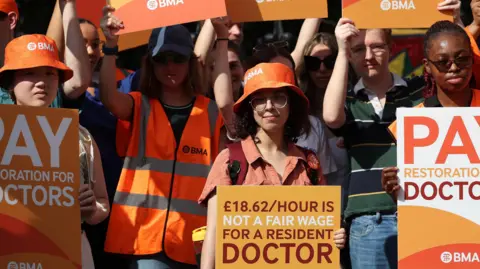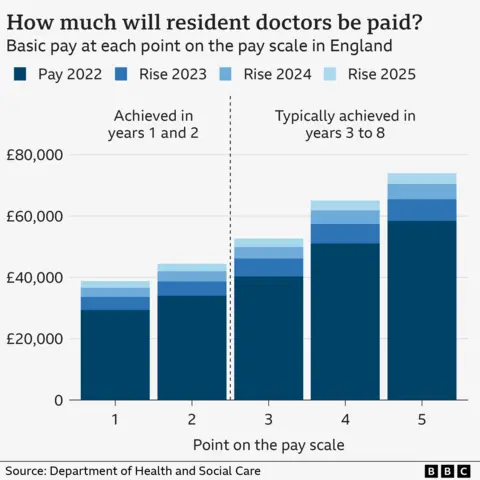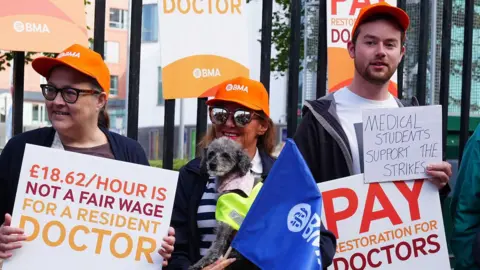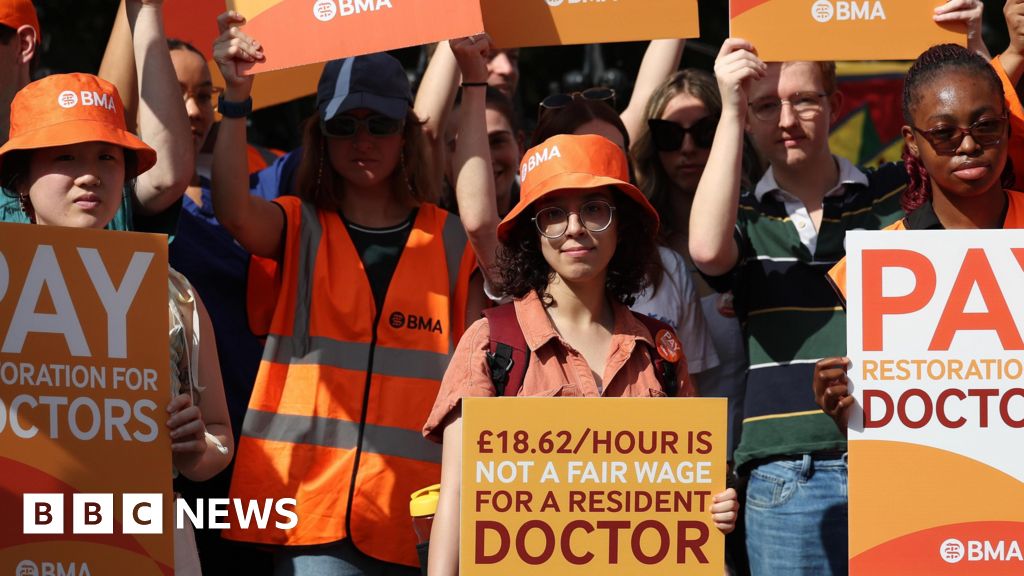Health correspondent
 PA Media
PA MediaThe NHS is facing a challenging few days during the doctors strike in England as it attempts to keep as many services as possible running, said the health secretary.
Wes Streeting said while it was not possible to eliminate disruption from the five-day strike by resident doctors, it was being kept to a minimum.
The strike by thousands of resident doctors, previously known as junior doctors, began on Friday after the government and British Medical Association (BMA) failed to reach an agreement over pay.
The NHS wants to keep non-urgent services running the walkout, with patients urged to attend appointments unless told they are cancelled. The BMA has warned staff are being stretched too thinly.
The BMA has meanwhile agreed one doctor can come off the picket line over the weekend to work at Nottingham City Hospital’s neonatal intensive care unit.
This is only the sixth time the BMA has agreed to let doctors return to work – known as derogation – during the long-running dispute.
Senior doctors are covering for resident doctors who are striking for the 12th time over pay.
No official figures have been released yet on the impact of the latest strike, but some hospitals are reporting more than 80% of their non-urgent work is still being done.
Members of the public have been urged to still come forward for NHS care in England during the walkout.
GP surgeries will open as usual, and urgent care and A&E will continue to be available, alongside NHS 111, NHS England said.
Writing in the Times before the strike, Prime Minister Sir Keir Starmer urged resident doctors not to follow their union down the “damaging road” of strike action.
Despite the efforts being put in by NHS leaders, he said the walkout would cause a “huge loss for the NHS and the country”, as he criticised the British Medical Association (BMA) for “rushing” into strikes.
Sir Keir said the walkouts threatened “to turn back the clock on progress we have made in rebuilding the NHS over the last year”.
Streeting said the government would “not let the BMA hold the country to ransom” and that it was doing “everything we can to minimise the risk to patients”.
He conceded disruption could not be “eliminated” and he and the prime minister were “angry” on behalf of patients and other NHS staff still working.
Previous walkouts have led to mass cancellations of operations, appointments and treatments.
More than one million were cancelled during resident doctor strikes in March 2023 and routine care was cut by half at some hospitals.

Doctors in Wales, Scotland and Northern Ireland are not part of the pay dispute.
Talks between the government and the union have been focused on non-pay issues, such as exam fees, working conditions and career progression, after Streeting had said pay was not open to negotiation.
There are currently no plans for more talks but this could change once the current strike action is over.
Government sources say the ball is very much in the BMA’s court and they still will not negotiate on pay.
The BMA says, despite a 5.4% average pay rise this year following a 22% increase over the previous two years, pay is still down by a fifth since 2008 once inflation is taken into account.
During their first foundation year after finishing a medical degree, resident doctors in England now earn a basic salary of £38,831, for an average of 48 hours worked a week. In the second year, this rises to £44,439. Salaries exceed £73,000 by the end of training.
Medics are often expected to work nightshifts, weekends and longer hours for extra pay. These top up their earnings by more than a quarter on average.
BMA resident doctor co-leaders Dr Melissa Ryan and Dr Ross Nieuwoudt said: “Resident doctors are not worth less than they were 17 years ago.
“Restoring pay remains the simplest and most effective route toward improving our working lives.
“Mr Streeting had every opportunity to prevent this strike, but he chose not to take it.”
 PA Media
PA MediaWhile the majority of resident doctors work in hospitals, some GP practices and community services could also be affected. Resident doctors represent nearly half the medical workforce.
Some patients have been affected. Hassnain Shahid, 32, from Bradford, said his three-year-old daughter had her lung surgery on Monday cancelled.
She has a rare lung condition which means a cold is a serious risk to her health.
“It’s been an emotional rollercoaster. It’s very frustrating,” said Hassnain.
The BMA said that it had written to NHS England to say that staff who work through the strike could be stretched too thinly. The union said it would be better to significantly reduce non-urgent care, as has happened previously.
But Saffron Cordery, deputy chief executive of NHS Providers, which represents hospitals, said hospitals trying to keep services running would do so within “rigorous safety guidelines”.
She said the situation was complicated by the fact that doctors were not obliged to say whether they would turn up.
“Nobody will know until they actually turn up for their shifts or not.”
Around two thirds of resident doctors are BMA members.
The Liberal Democrats have called for an NHS strike resilience plan, using private hospitals for some elective treatments.
The Conservative shadow health secretary Stuart Andrew said the strikes threatened to drag hospitals into chaos and leave patients “dangerously exposed”.
He criticised what he called Labour’s “spineless surrender to union demands” last year, which he said allowed the BMA to come “back for more”.
Rory Deighton, of the NHS Confederation, which represents frontline health managers, said: “The impact of these strikes and the distress they will cause patients rests with the BMA.”




